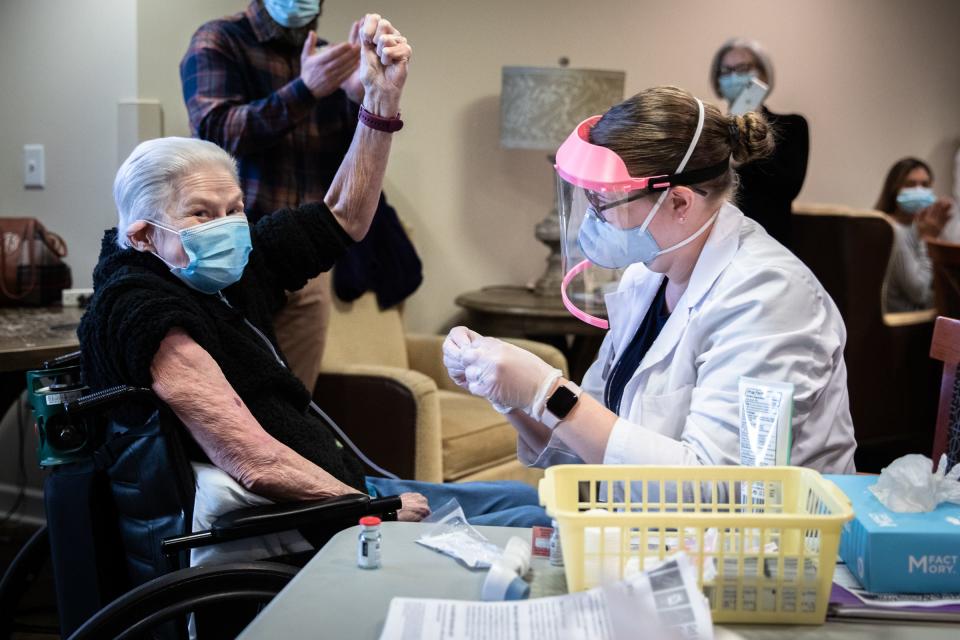COVID-19 hospitalizations trending lower in SC. What to know about the virus and vaccines.
- Oops!Something went wrong.Please try again later.
- Oops!Something went wrong.Please try again later.
The height of the COVID-19 pandemic may be over, but the virus is still around in different variants.
Upstate residents should plan to protect themselves from COVID before the upcoming flu season, doctors say.
"You can die of this. It's not the norm, but it can still happen," said Dr. Helmut Albrecht, Infectious Disease Specialist and Medical Director for the Center of Infectious Diseases Research and Policy for Prisma Health and the University of South Carolina.
COVID has now been classified by health officials as an endemic, meaning it can be more easily prevented and treated.
Children, the elderly and those with a weakened immune system should continue to be extra cautious and make sure they are up to date with vaccinations, Albrecht said.
COVID cases dropped sharply in the past year
This year through Aug. 12, the S.C. Department of Health and Environmental Control (DHEC) reported just over 25,000 cases and 353 deaths in the Upstate, including Oconee, Pickens, Greenville, Spartanburg, Cherokee, Union, Laurens, Anderson, Abbeville, Greenwood and McCormick.
That is down significantly from last year, when there were a reported 229,590 cases and 1,662 deaths in DHEC's 11-county Upstate region.
The Centers for Disease Control and Prevention (CDC) data tracker indicates COVID-19 hospitalizations are generally lower across the state this year.

Last year, the highest statewide weekly total of 2,765 occurred in January. Weekly totals dropped to a low of 73 in April, then rose again to more than 700 in July and August, then dropped to 205 in November.
This year began with a high of 870 hospital admissions in January. Weekly totals then dropped to a low of 56 in June, then rose to 240 the week ending Aug. 12.
"I think we've seen various peaks and surges (of COVID-19)," said Dr. Jonathan Knoche, medical consultant with DHEC's Divisions of Immunization and Acute Disease Epidemiology.
"There's a good proportion of the population that has a level of immunity either from being vaccinated or having the infection in the past, so I think that's some reason for optimism," Knoche added.
With the fall and winter flu season approaching, residents should guard themselves from not only COVID-19 but Respiratory Syncytial Virus (RSV) and the common cold, as well, Knoche said.
Getting vaccinated is still the primary source of protection from illness and hospitalizations, Knoche said.
The new COVID booster is not available yet but will be soon. Albrecht said the new booster is not a "bivalent" vaccine and is designed only for the new omicron subvariant.
Hospital officials said there is no need to send people back for the current booster if they can wait and get the new booster. They also emphasize people to get the flu shot because they said the flu shot is just as important.
The CDC recommends everyone ages 6 months and older receive Pfizer-BioNTech or Moderna COVID-19 vaccine to be up to date. The CDC also recommends talking to a doctor if unsure about when to get vaccinated.
Methods of protection, symptoms
COVID often targets the upper airways, causing coughs, runny nose and congestion. Other symptoms include headaches, muscle aches and low-grade fevers.
With the current omicron variant, known as the XBB.1.5. strain, a headache has been a common symptom.
It is important to assess your risk of contracting COVID-19, as well as those you live with, according to Albrecht.Children, the elderly and the immunocompromised should continue to be extra cautious.
"We've seen more local outbreaks nowadays, and that's the sort of expected behavior of a virus that has arranged itself with a human population. But we are always concerned about a certain population of the community that we take care of," he said.
The CDC offers these tips to help stop COVID-19.
If you are sick, staying home and isolating can protect not only yourself but others, Albrecht said.
"It's not a sign of weakness to wear a mask," he said.
Nina Tran covers trending topics. Reach her via email at ntran@gannett.com
Reach Bob Montgomery at bob.montgomery@shj.com.
This article originally appeared on Greenville News: COVID-19 hospitalizations, deaths continue to trend down in SC.

